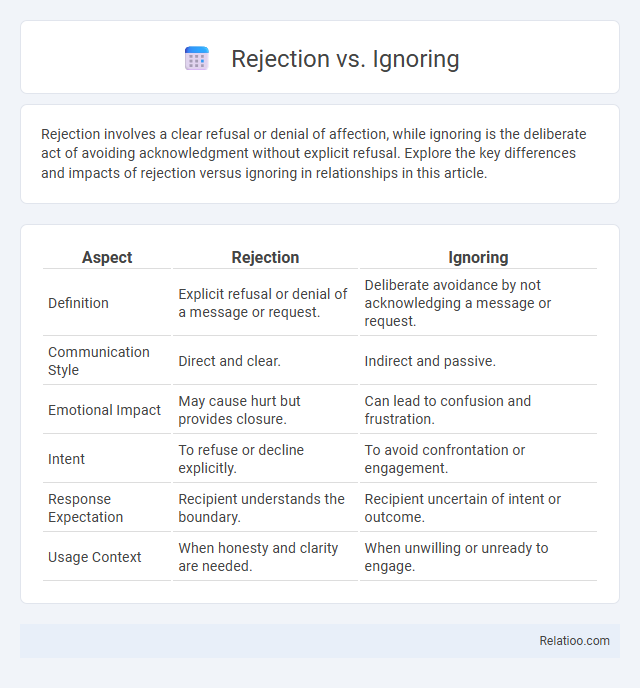Rejection involves a clear refusal or denial of affection, while ignoring is the deliberate act of avoiding acknowledgment without explicit refusal. Explore the key differences and impacts of rejection versus ignoring in relationships in this article.
Table of Comparison
| Aspect | Rejection | Ignoring |
|---|---|---|
| Definition | Explicit refusal or denial of a message or request. | Deliberate avoidance by not acknowledging a message or request. |
| Communication Style | Direct and clear. | Indirect and passive. |
| Emotional Impact | May cause hurt but provides closure. | Can lead to confusion and frustration. |
| Intent | To refuse or decline explicitly. | To avoid confrontation or engagement. |
| Response Expectation | Recipient understands the boundary. | Recipient uncertain of intent or outcome. |
| Usage Context | When honesty and clarity are needed. | When unwilling or unready to engage. |
Understanding Rejection and Ignoring
Understanding rejection involves recognizing the emotional impact when one's ideas, feelings, or presence are actively dismissed or refused, often leading to feelings of inadequacy or exclusion. Ignoring, by contrast, entails a passive withholding of attention or response, which can create confusion and ambiguity about one's value or standing in relationships or social settings. Differentiating these responses is crucial for effective communication and emotional resilience, as rejection is explicit and often confrontational, whereas ignoring is implicit and can be more psychologically distressing due to its uncertainty.
Key Differences Between Rejection and Ignoring
Rejection involves an explicit dismissal or refusal, often communicated clearly through words or actions, while ignoring is characterized by the absence of response or acknowledgment, making it more passive. Rejection typically conveys a conscious decision that can evoke strong emotional reactions, whereas ignoring may create ambiguity, leading to uncertainty about the other person's feelings or intentions. Understanding these distinctions is essential in interpersonal communication, as rejection signals definitive boundaries, and ignoring often leaves room for interpretation and unresolved tension.
Psychological Impact of Rejection
Rejection triggers intense emotional responses such as sadness, anxiety, and lowered self-esteem, often leading to long-term psychological distress. Ignoring, while less overt, can cause feelings of invisibility and social isolation, impacting mental well-being by fostering loneliness and low self-worth. The psychological impact of repeated rejection can exacerbate negative beliefs about oneself, increasing vulnerability to depression and social anxiety disorders.
Emotional Effects of Being Ignored
Being ignored often causes deeper emotional pain than outright rejection because it leaves your feelings unacknowledged and fosters a sense of invisibility. This emotional neglect can lead to increased anxiety, lowered self-esteem, and feelings of isolation. Unlike clear rejection, which provides closure, being ignored prolongs uncertainty and emotional distress.
Why People Reject vs. Why People Ignore
People reject when they actively decide that something or someone does not meet their needs, values, or expectations, often due to perceived flaws or incompatibility. Ignoring occurs when people deliberately choose to withhold attention or response, usually to avoid conflict or because they deem the issue insignificant. Understanding why you experience rejection versus being ignored can clarify whether the reaction is rooted in active disapproval or passive avoidance.
Communication Breakdown: Silent Treatment vs. Directness
Rejection involves explicitly expressing disapproval or dismissal, clearly communicating boundaries or feelings, while ignoring manifests as a silent treatment, an absence of response that can create confusion and emotional distress due to lack of clarity. Communication breakdown occurs when ignoring replaces directness, leading to misunderstandings and unresolved conflicts, whereas direct rejection, though potentially uncomfortable, facilitates clearer emotional processing and resolution. Understanding these dynamics is crucial for effective interpersonal communication, as silent treatment often undermines trust and openness, whereas directness fosters honesty and mutual respect.
Coping Strategies for Rejection
Experiencing rejection triggers emotional pain that differs from ignoring, which involves neglect without explicit denial, and requires specific coping strategies to manage effectively. You can build resilience by reframing rejection as an opportunity for growth, practicing self-compassion, and seeking social support to reduce feelings of isolation. Developing these coping mechanisms enhances emotional well-being and fosters a healthier response to setbacks in personal and professional contexts.
How to Handle Being Ignored
Handling being ignored requires recognizing that silence often reflects the other person's state or priorities rather than your worth. Focus on maintaining clear communication by expressing your feelings calmly and setting boundaries to protect your emotional health. Engaging in activities that boost self-esteem and seeking support from trusted individuals reinforces resilience during periods of being overlooked.
Which Hurts More: Rejection or Ignoring?
Rejection often feels more painful than ignoring because it provides a clear negative response, triggering an emotional reaction and a sense of finality in Your mind. Ignoring, however, can create uncertainty and prolonged anxiety, as the lack of feedback leaves You wondering about the reasons behind the silence. Studies in psychology suggest that while rejection cuts directly to self-esteem, ignoring can cause deeper stress due to ambiguity and unresolved emotions.
Moving Forward: Building Resilience and Self-Worth
Rejection often triggers feelings of failure, while ignoring can lead to uncertainty or confusion about your worth. Building resilience involves recognizing these emotional responses and choosing to move forward by focusing on personal growth and self-compassion. Developing a strong sense of self-worth empowers you to face challenges confidently and transform setbacks into opportunities for growth.

Infographic: Rejection vs Ignoring
 relatioo.com
relatioo.com